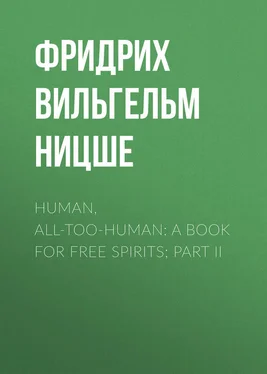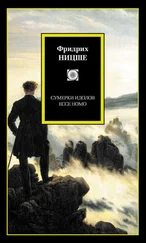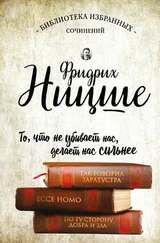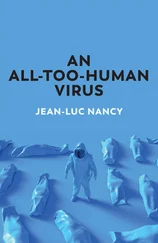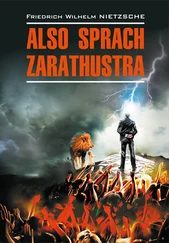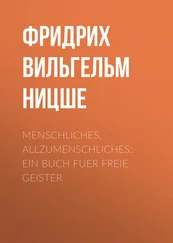Фридрих Ницше - Human, All-Too-Human - A Book For Free Spirits; Part II
Здесь есть возможность читать онлайн «Фридрих Ницше - Human, All-Too-Human - A Book For Free Spirits; Part II» — ознакомительный отрывок электронной книги совершенно бесплатно, а после прочтения отрывка купить полную версию. В некоторых случаях можно слушать аудио, скачать через торрент в формате fb2 и присутствует краткое содержание. Жанр: Философия, literature_19, foreign_antique, foreign_prose, на английском языке. Описание произведения, (предисловие) а так же отзывы посетителей доступны на портале библиотеки ЛибКат.
- Название:Human, All-Too-Human: A Book For Free Spirits; Part II
- Автор:
- Жанр:
- Год:неизвестен
- ISBN:нет данных
- Рейтинг книги:3 / 5. Голосов: 1
-
Избранное:Добавить в избранное
- Отзывы:
-
Ваша оценка:
- 60
- 1
- 2
- 3
- 4
- 5
Human, All-Too-Human: A Book For Free Spirits; Part II: краткое содержание, описание и аннотация
Предлагаем к чтению аннотацию, описание, краткое содержание или предисловие (зависит от того, что написал сам автор книги «Human, All-Too-Human: A Book For Free Spirits; Part II»). Если вы не нашли необходимую информацию о книге — напишите в комментариях, мы постараемся отыскать её.
Human, All-Too-Human: A Book For Free Spirits; Part II — читать онлайн ознакомительный отрывок
Ниже представлен текст книги, разбитый по страницам. Система сохранения места последней прочитанной страницы, позволяет с удобством читать онлайн бесплатно книгу «Human, All-Too-Human: A Book For Free Spirits; Part II», без необходимости каждый раз заново искать на чём Вы остановились. Поставьте закладку, и сможете в любой момент перейти на страницу, на которой закончили чтение.
Интервал:
Закладка:
The Metaphysicians' Knapsack. – To all who talk so boastfully of the scientific basis of their metaphysics it is best to make no reply. It is enough to tug at the bundle that they rather shyly keep hidden behind their backs. If one succeeds in lifting it, the results of that “scientific basis” come to light, to their great confusion: a dear little “God,” a genteel immortality, perhaps a little spiritualism, and in any case a complicated mass of poor-sinners'-misery and pharisee-arrogance.
Occasional Harmfulness of Knowledge. – The utility involved in the unchecked investigation of knowledge is so constantly proved in a hundred different ways that one must remember to include in the bargain the subtler and rarer damage which individuals must suffer on that account. The chemist cannot avoid occasionally being poisoned or burnt at his experiments. What applies to the chemist, is true of the whole of our culture. This, it may be added, clearly shows that knowledge should provide itself with healing balsam against burns and should always have antidotes ready against poisons.
The Craving of the Philistine. – The Philistine thinks that his most urgent need is a purple patch or turban of metaphysics, nor will he let it slip. Yet he would look less ridiculous without this adornment.
Enthusiasts. – With all that enthusiasts say in favour of their gospel or their master they are defending themselves, however much they comport themselves as the judges and not the accused: because they are involuntarily reminded almost at every moment that they are exceptions and have to assert their legitimacy.
The Good Seduces to Life. – All good things, even all good books that are written against life, are strong means of attraction to life.
The Happiness of the Historian. – “When we hear the hair-splitting metaphysicians and prophets of the after-world speak, we others feel indeed that we are the ‘poor in spirit,’ but that ours is the heavenly kingdom of change, with spring and autumn, summer and winter, and theirs the after-world, with its grey, everlasting frosts and shadows.” Thus soliloquised a man as he walked in the morning sunshine, a man who in his pursuit of history has constantly changed not only his mind but his heart. In contrast to the metaphysicians, he is happy to harbour in himself not an “immortal soul” but many mortal souls.
Three Varieties of Thinkers. – There are streaming, flowing, trickling mineral springs, and three corresponding varieties of thinkers. The layman values them by the volume of the water, the expert by the contents of the water – in other words, by the elements in them that are not water.
The Picture of Life. – The task of painting the picture of life, often as it has been attempted by poets and philosophers, is nevertheless irrational. Even in the hands of the greatest artist-thinkers, pictures and miniatures of one life only – their own – have come into being, and indeed no other result is possible. While in the process of developing, a thing that develops, cannot mirror itself as fixed and permanent, as a definite object .
Truth will have no Gods before it. – The belief in truth begins with the doubt of all truths in which one has previously believed.
Where Silence is Required. – If we speak of freethinking as of a highly dangerous journey over glaciers and frozen seas, we find that those who do not care to travel on this track are offended, as if they had been reproached with cowardice and weak knees. The difficult, which we find to be beyond our powers, must not even be mentioned in our presence.
Historia in Nuce. – The most serious parody I ever heard was this: “In the beginning was the nonsense, and the nonsense was with God, and the nonsense was God.” 4
Incurable. – The idealist is incorrigible: if he be thrown out of his Heaven, he makes himself a suitable ideal out of Hell. Disillusion him, and lo! he will embrace disillusionment with no less ardour than he recently embraced hope. In so far as his impulse belongs to the great incurable impulses of human nature, he can bring about tragic destinies and later become a subject for tragedy himself, for such tragedies as deal with the incurable, implacable, inevitable in the lot and character of man.
Applause Itself as the Continuation of the Play. – Sparkling eyes and an amiable smile are the tributes of applause paid to all the great comedy of world and existence – but this applause is a comedy within a comedy, meant to tempt the other spectators to a plaudite amici .
Courage for Tedium. – He who has not the courage to allow himself and his work to be considered tedious, is certainly no intellect of the first rank, whether in the arts or in the sciences. – A scoffer, who happened for once in a way to be a thinker, might add, with a glance at the world and at history: “God did not possess this courage, for he wanted to make and he made all things so interesting.”
From the Most Intimate Experience of the Thinker. – Nothing is harder for a man than to conceive of an object impersonally, I mean to see in it an object and not a person. One may even ask whether it is possible for him to dispense for a single moment with the machinery of his instinct to create and construct a personality. After all, he associates with his thoughts, however abstract they may be, as with individuals, against whom he must fight or to whom he must attach himself, whom he must protect, support and nourish. Let us watch or listen to ourselves at the moment when we hear or discover a new idea. Perhaps it displeases us because it is so defiant and so autocratic, and we unconsciously ask ourselves whether we cannot place a contradiction of it by its side as an enemy, or fasten on to it a “perhaps” or a “sometimes”: the mere little word “probably” gives us a feeling of satisfaction, for it shatters the oppressive tyranny of the unconditional. If, on the other hand, the new idea enters in gentle shape, sweetly patient and humble, and falling at once into the arms of contradiction, we put our autocracy to the test in another way. Can we not come to the aid of this weak creature, stroke it and feed it, give it strength and fulness, and truth and even unconditionality? Is it possible for us to show ourselves parental or chivalrous or compassionate towards our idea? – Then again, we see here a judgment and there a judgment, sundered from each other, never looking at or making any movement towards each other. So we are tickled by the thought, whether it be not here feasible to make a match, to draw a conclusion , with the anticipation that if a consequence follows this conclusion it is not only the two judgments united in wedlock but the matchmakers that will gain honour. If, however, we cannot acquire a hold upon that thought either on the path of defiance and ill-will or on that of good-will (if we hold it to be true) – then we submit to it and do homage to it as a leader and a prince, give it a chair of honour, and speak not of it without a flourish of trumpets: for we are bright in its brightness. Woe to him who tries to dim this brightness! Perhaps we ourselves one day grow suspicious of our idea. Then we, the indefatigable “king-makers” of the history of the intellect, cast it down from its throne and immediately exalt its adversary. Surely if this be considered and thought out a little further, no one will speak of an “absolute impulse to knowledge”!
Читать дальшеИнтервал:
Закладка:
Похожие книги на «Human, All-Too-Human: A Book For Free Spirits; Part II»
Представляем Вашему вниманию похожие книги на «Human, All-Too-Human: A Book For Free Spirits; Part II» списком для выбора. Мы отобрали схожую по названию и смыслу литературу в надежде предоставить читателям больше вариантов отыскать новые, интересные, ещё непрочитанные произведения.
Обсуждение, отзывы о книге «Human, All-Too-Human: A Book For Free Spirits; Part II» и просто собственные мнения читателей. Оставьте ваши комментарии, напишите, что Вы думаете о произведении, его смысле или главных героях. Укажите что конкретно понравилось, а что нет, и почему Вы так считаете.
